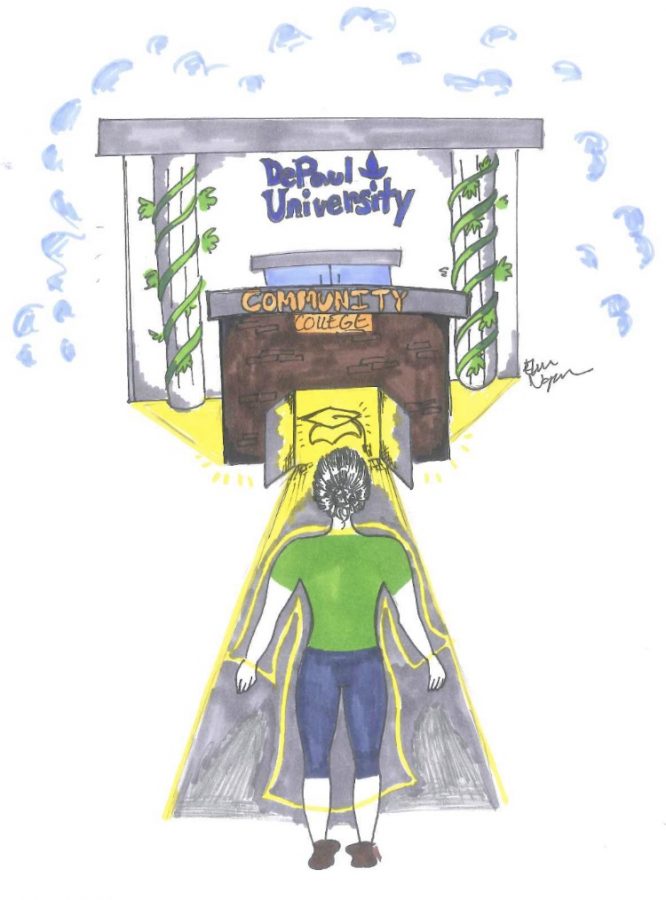Changing the conversation: destigmatizing community college
OPINION
When I first began brainstorming colleges that I wanted to attend, my mind instantly started listing well known universities: Northwestern, Loyola, Marquette. It has been engraved in our brains that we should all go away to a prestigious university. In movies you always see parents driving their child off to college and embracing them with tears.
I always thought this would be the case with me; however as I did more and more research, I came to realize that community college is a smart option, yet it is underappreciated.
Community college allows students to earn an associate’s degree that can be transferred to a four-year university.
On average, the yearly tuition and fees for a private four-year college is $32,410, while the yearly cost of tuition and fees for a two-year college is $3,440, according to the College Board.
This provides a great route for students who are struggling financially, as well as for students who are undecided and want to take advantage of completing their general credits at a fraction of the cost.
In addition to affordability, community college provides transfer opportunities — particularly with scholarships. This means that you can get even more money from partnership schools, just by being a community college student.
In fact, the City Colleges of Chicago (CCC) “has robust transfer agreements with 86 four-year institutions, including at Illinois Institute of Technology, University of Illinois at Chicago and DePaul University,” according to the CCC website.
As I was sitting at my computer, astonished at all these benefits that community colleges in Chicago offer, I could not wrap my head around why there is such a strong stigma against them.
I think a big part of this issue is that community college isn’t a topic of discussion that comes up often and as a result, misconceptions arise.
Instead, it’s something that is brushed aside because students don’t want to aim for community college, but rather more well-known schools.
According to counselor Ms. Carqueville, this ideology is similar in applying to high school.
“When you say ‘Oh I’m going to Lane,’ you have a lot of pride in where you’re going, and it also says a lot about you because it says you were able to and you were smart enough to get into a school that’s highly respected and highly competitive,” Carqueville said.
I myself was ashamed to even consider applying to community colleges because I felt that all my friends would be attending competitive schools, while I would be attending a school that accepts everyone.
When I do hear people talk about community college, there is such a negative connotation that goes along with it. I have heard people say that community college is for dropouts or for people with a low GPA.
This is not the case, because it’s important to understand that everyone’s situation is different.
Not everyone can afford to attend a four-year institution and some may have personal reasons for why they can’t leave their family. Therefore, to say that community college is for dropouts or below average students is a completely unfair assumption.
Another factor that upsets me is how community colleges are looked down upon because of their low graduation rate.
For example, the graduation rate for Wilbur Wright Community College is 16 percent, compared to 85 percent for University of Illinois at Urbana-Champaign, according to FAFSA.
Even though there is a drastic difference in graduation rates between both schools, it is important to keep in mind that community college is unique in that they have a diverse population of students. Some may be full-time students, while others are balancing school, work and family responsibilities.
A low graduation rate should not solely determine the quality of education of any school, especially community colleges.
When talking to my friends and peers about community college, a recurring argument was that it does not provide you with a traditional college experience.
“You have people who only take one class a semester so they’re not in the building to study with, or everyone sort of has their own life, so you may not feel as though you are a part of a supportive community,” Carqueville said.
With regard to student life, “there are over 100 student clubs, groups and organizations across the City Colleges,” according to the CCC website. With that being said, there is still a way to get involved and feel as though you are a part of your school community.
In today’s society, college is no longer a luxury. In order to be financially stable and successful, a college degree is required.
According to the National Center for Education Statistics, in 2015 about 77.2 percent of 25- to 34-year-olds with a bachelor’s or higher degree in the labor force had year-round, full-time jobs, compared to 58.6 percent of those without a high school diploma.
This ties in with the competitive atmosphere that goes along with applying to college. With everyone wanting to get accepted into the top schools, it is easy to view community college as the last resort.
However, when applying to college, it’s important to keep an open mind and lay out all possible options.
I have to admit that before I did any college research, I was not well-informed, which led me to believe all these misconceptions. However, after attending a community college informational session, it opened my eyes to the wonderful opportunities that a community college can bring you.
I came to realize that community college is a great alternative and it is not something to be ashamed of. Community college can be your first step in earning a degree. As long as you have a four-year plan and stick to it, it doesn’t matter where you start.
Every student is different, making every pathway to a college experience different as well. You better believe I will proudly wear my community college shirt on decision day if I decide that’s where I’m going to begin my college journey.
Your donations directly fund the Lane Tech student journalism program—covering essential costs like website hosting and technology not supported by our school or district. Your generosity empowers our student reporters to investigate, write, and publish impactful stories that matter to our school community.
This website is more than a publishing platform—it's an archive, a research tool, and a source of truth. Every dollar helps us preserve and grow this resource so future students can learn from and build on the work being done today.
Thank you for supporting the next generation of journalists at Lane Tech College Prep!

Clarissa Corral is a senior at Lane. She is very passionate about writing and journalism is something that she would like to pursue in college. Her dream...

